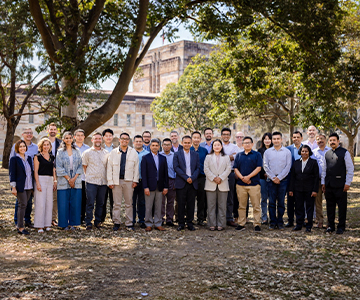

South Asian nations face the dual challenge of meeting growing energy demand while transitioning to cleaner and more sustainable low-cost energy sources. Unless clean technologies are deployed, energy-related GHG emissions from Bangladesh, Bhutan, the Maldives, Nepal, and Sri Lanka will rise from about 58 million tons of carbon dioxide equivalent in 2005 to about 245 million in 2030, largely due to rising energy consumption by industry and transport. Green hydrogen can be a promising solution to reduce carbon emission, provide energy security, power storage and generation, meet transport energy demand and support sustainable economic and social development.
SARIC Green Hydrogen Study and Networking tour provided a valuable opportunity to share learnings from the Australian and international experience.
This 1-week study and networking tour aimed to:
- Enhance knowledge and address skill gaps reported by projects of the World Bank and IFC leading to holistic capacity building of the participants relating to green hydrogen production and use, particularly in relation to regulation, financing and development of industry ecosystem
- Increase senior executive understanding and support from across all SARIC priority countries, both government and private sector, in green hydrogen production
- Provide participants with increased knowledge and exposure to a wider set of relationships, including with Australian industry and government
- Encourage participants from the region to absorb knowledge and good practice and to work together across borders
- Ensure best use of Australian expertise to contribute to the development of individuals and institutions concerned with regional connectivity by leveraging Australian universities or training institutions expertise
The study tour was built around the themes covered in the Asia-Pacific Hydrogen Summit and Exhibition which concludes the weeklong program. It encompassed end-to-end hydrogen supply chain considerations, government regulation and policy, and industry learnings from the early-stage development of hydrogen industry in Australia.

Topics include:
- Electrolyser research and development
- Renewable energy transmission
- Hydrogen refuelling infrastructure for heavy vehicles
- Sustainable Aviation Fuels
- Social license and how to engage community in development
- Skills development

- Guided tour of operating hydrogen production facility
- Visited Self-contained hydrogen powered energy storage unit that provides small scale on-site production of green hydrogen
- Met with Queensland Government hydrogen development unit – to gain understanding of Queensland governments approach to facilitating development
- Visited Wildfire energy, waste (non-recyclable land fill) to energy (syngas CO + H2) facility
- Others

- The summit was supported by the Queensland and Australian Government with a program developed by the Australian Hydrogen Council and support from Austrade
- It offered an opportunity to understand some of Australia and the worlds larger scale hydrogen projects and the government policy that supports these developments
- In addition to the technical presentations, SARIC collaborated with Austrade and DFAT to ensure the delegation is offered networking opportunities
- A networking event was hosted by SARIC
To know more about to the summit, click here
Through a combination of conference participation, technical masterclass, site visits, meetings and interactions with Australian experts, government agencies and private businesses, extended by within-group discussion, participants benefited from:
- Increased awareness of the international experience in developing green hydrogen industry and the elements needed to establish an internationally competitive hydrogen sector
- Skill and knowledge enhancement on issues critical to planning, developing, regulating and financing green hydrogen developments
- Understanding of enabling policies and regulations designed to support hydrogen industry development
- Relationships and networking that foster coalitions and a greater willingness within government to explore new ways of working